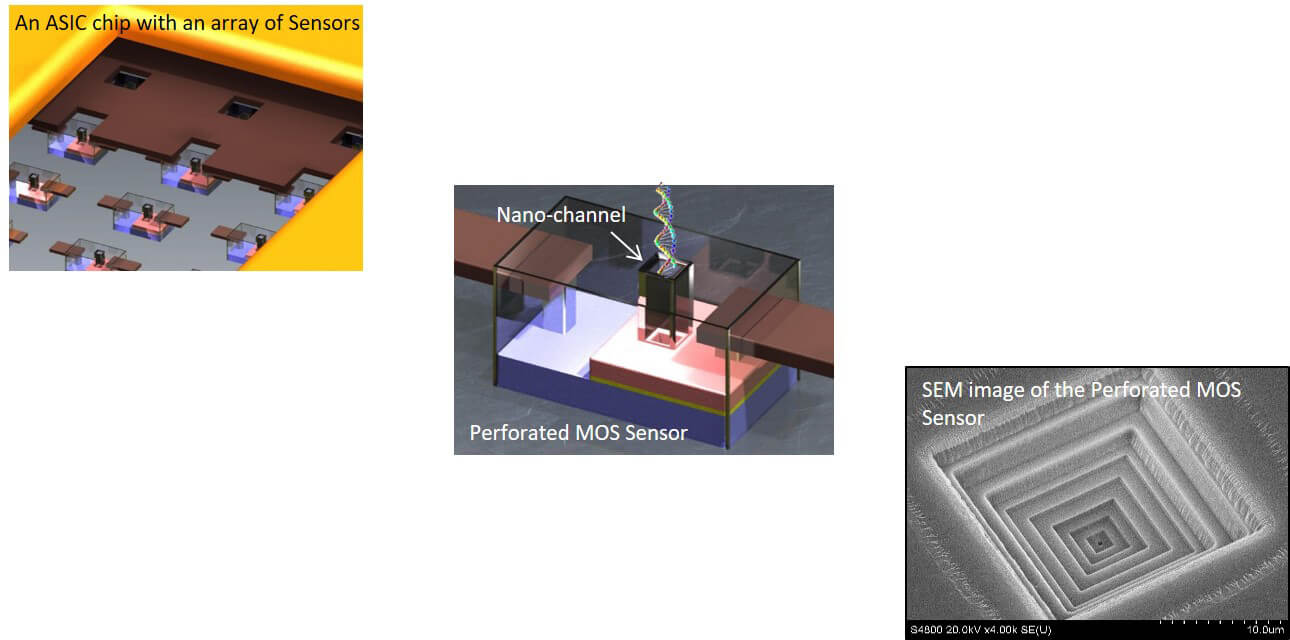May 21, 2020
Chip for biomolecule detection may help in COVID-19 testing
 A Purdue University patented method for single biomolecule detection that overcomes limitations of current technologies may help in the fight against COVID-19. (Image provided)
Download image
A Purdue University patented method for single biomolecule detection that overcomes limitations of current technologies may help in the fight against COVID-19. (Image provided)
Download image
WEST LAFAYETTE, Ind. – A patented method for single biomolecule detection that overcomes limitations of current technologies may help in the fight against COVID-19.
Purdue University innovators created a method that uses a special sensor similar to a computer chip. The application-specific integrated circuit chip is designed for the early detection of a number of pathogens and viruses.
“We want to find partners to move this technology to the public as soon as we can to help in COVID-19 testing,” said Saeed Mohammadi, a Purdue professor of electrical and computer engineering. “We know it can be an effective, easy and inexpensive method for detecting viruses, potentially the one linked to the current pandemic.”
The Purdue technique involves machine learning to train the system to detect certain features associated with particular diseases and viruses. Then, when a sample is run through the system, it can detect those features and confirm the presence of particular viruses and diseases. Simulations have shown this technique may be effective in detecting COVID-19.
This method uses a metal-oxide semiconductor sensor with embedded, fluidic nanochannels. As a biomolecule moves through the nanochannel, a high frequency current is measured that contains information about the biomolecule, such as the type of nucleotides in the case of DNA/RNA, which can be used to classify the molecule.
Mohammadi said, “This method does not have the problems associated with other nanopore techniques because it does not require the difficult drilling of extremely small nanopores, can detect four nucleotides at a time, and is not significantly affected by the rotation or position of the biomolecule in the nanochannel.”
Mohammadi said the technology is simple enough that a manufacturer could use it to develop a test kit that could be used at home for virus and disease detection.
The team worked with the Purdue Research Foundation Office of Technology Commercialization to patent this technology. The office recently moved into the Convergence Center for Innovation and Collaboration in Discovery Park District, adjacent to the Purdue campus.
The researchers are looking for partners to continue developing their technology. For more information on licensing and other opportunities, contact Matthew Halladay of OTC at mrhalladay@prf.org and mention track code 2013-MOHA-66407.
The researchers received support from the Trask Innovation Fund, a development program established to support projects that advance the commercial value of Purdue intellectual property. The fund makes awards twice a year to aid faculty and staff with their patented innovations that are being commercialized through OTC.
About Purdue Research Foundation Office of Technology Commercialization
The Purdue Research Foundation Office of Technology Commercialization operates one of the most comprehensive technology transfer programs among leading research universities in the U.S. Services provided by this office support the economic development initiatives of Purdue University and benefit the university's academic activities through commercializing, licensing and protecting Purdue intellectual property. The office recently moved into the Convergence Center for Innovation and Collaboration in Discovery Park District, adjacent to the Purdue campus. In fiscal year 2019, the office reported 136 deals finalized with 231 technologies signed, 380 disclosures received and 141 issued U.S. patents. The office is managed by the Purdue Research Foundation, which received the 2019 Innovation and Economic Prosperity Universities Award for Place from the Association of Public and Land-grant Universities. In 2020, IPWatchdog Institute ranked Purdue third nationally in startup creation and in the top 20 for patents. The Purdue Research Foundation is a private, nonprofit foundation created to advance the mission of Purdue University. Contact otcip@prf.org for more information.
About Purdue University
Purdue University is a top public research institution developing practical solutions to today’s toughest challenges. Ranked the No. 6 Most Innovative University in the United States by U.S. News & World Report, Purdue delivers world-changing research and out-of-this-world discovery. Committed to hands-on and online, real-world learning, Purdue offers a transformative education to all. Committed to affordability and accessibility, Purdue has frozen tuition and most fees at 2012-13 levels, enabling more students than ever to graduate debt-free. See how Purdue never stops in the persistent pursuit of the next giant leap at purdue.edu.
Writer: Chris Adam, 765-588-3341, cladam@prf.org
Source: Saeed Mohammadi, saeedm@purdue.edu

